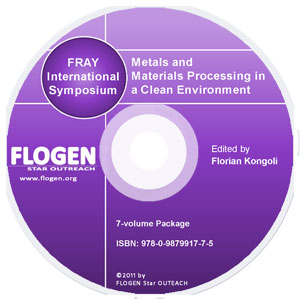
CD shopping page |
2011-Sustainable Industrial Processing Summit
|
| Editors: | Florian K |
| Publisher: | Flogen Star OUTREACH |
| Publication Year: | 2012 |
| Pages: | 630 pages |
| ISBN: | 978-0-9879917-2-0 |
| ISSN: | 2291-1227 (Metals and Materials Processing in a Clean Environment Series) |
The Methodology Of Developing Rare Metals Electrorefining Technology
Oleg I. Rebrin1; Ilya Polovov1; Vladimir Volkovich1; Trevor Griffiths2;1URAL FEDERAL UNIVERSITY, Ekaterinburg, Russia; 2REDSTON TREVOR CONSULTING LTD, Leeds, United Kingdom;
Type of Paper: Regular
Id Paper: 128
Topic: 6
Abstract:
The perspectives of widening rare metals application in modern technologies are determined by the metals purity and availability and thus depend on the improvements in refining techniques. The majority of less-common metal refining technologies, such as vacuum melting, distillation, electrotransport, zone recrystallization are based on the metals physical properties. The effectiveness of such processes is determined by achievement of very clean industrial conditions and prevention of metal contamination by corrosion products of constructive materials. Moreover, it is necessary to take into account the high costs of such type equipment and its maintenance.Electrolytic refining in molten salts presents a substantial alternative to the physical methods of metal purification. This approach can be realised at considerably lower temperatures using simpler equipment, and in this case a highly automatic continuous technological process can be organized. The most effective way of producing high purity metals with total impurities content of less than 0.01 wt. %, is the combination of physical and electrochemical methods.Elaboration of an electrorefining technology involves several stages. The first is the selection of working electrolyte. The basis for selecting a suitable salt mixture is the information on physico-chemical properties of electrolytes. The data concerning melting points, electrical conductivity, density and other properties of the melts should be integrated in a united universal database for convenient and fast access. Using database control options one can automatically chose salt compositions that satisfy necessary requirements. The information about speciation of refined metal is also important for organization of electrorefining process. These data can be obtained during analysis of physico-chemical and thermodynamic properties of molten salts using different models of liquid structure or spectroscopic data. The combination of spectroscopic and electrochemichal methods of analysis is a very prospective direction of research.The optimal organization of electrolytic production of metals from molten salts should be based on understanding mechanisms of processes taking place when the electric current is passed through the system. The electrorefining consists of two phases: anodic dissolution and cathodic deposition of the metal. If the electrorefining process can be performed under equilibrium conditions we’ll purify the refined metal from electropositive impurities during the anodic stage and retain the electronegative metals in the electrolyte in the course of the cathodic cycle. However, in real life we encounter the phenomenon of electrode polarization, i.e. the shift of electrode potential from the equilibrium value. The subject of the electrode process kinetics is determination of reasons of polarization and its characteristics. Galvanostatic methods are the most fully corresponding to the conditions of electrolytic refining. At the same time the useful information about electrode reactions and kinetic parameters can be obtained from other voltammetric methods.The main task of electrorefining process is production of maximum quantity of highly purified metal. The quantitative parameters characterizing solving this task are the degree of extraction and purity of the obtained product. A number of factors influence the result of the refining process including the electrolyte composition, temperature, cathodic and anodic current densities, specific quantity of electricity, etc. The goal of the process optimization can be effectively achieved using the theory of mathematical planning of experiments. The latter allows building an adequate model of the experiment. Subsequently it becomes possible by applying this model to predict the result of any experiment performed in the field of the model validity and to found conditions for obtaining required result.After fulfilling the described stages one can start applying electrorefining technology to a semi-industrial scale including elaboration of electrolyser design, choice of technology of cathodic deposit reprocessing and other associated procedures.